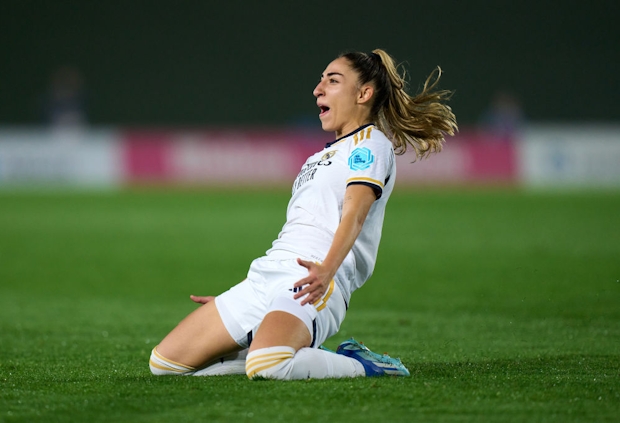
Women’s sport is having a moment.
Media, analysts and brands, they’re all saying it and they’re not wrong. There has been undeniable growth across many women’s sports properties, especially in women’s football and basketball.
Viewing figures, sponsorships and – to a lesser extent – broadcast deals, have increased in value and created a one-way stream of positive PR and at times gushing narrative. But the women’s sport bubble isn’t necessarily on secure ground.
This was typified this week with news of DAZN reversing its decision to put its global women’s football coverage behind a paywall. In a grandiose press release, the broadcaster called for support from all stakeholders for a “new deal” in the game that promotes a “venture capital mindset”.
DAZN currently pays €7m annually for exclusive broadcast rights in most international markets to the Uefa Women’s Champions League. In order to monetise that investment, it planned to put all bar 19 matches behind a paywall in each of the four-year deal’s last two seasons.

Yet, there is little appetite among women’s club football’s (young) core audience to commit to a pay-TV subscription. The move to make all content free will be viewed by some as a vindication of the advertising dollars to be mined. Fans will celebrate news of the free access. For the rest of the industry, it serves as a warning that commercial decisions have to come at the time when a sport is ready.
In the same week, news emerged of Uefa going to market with commercial rights to the UWCL. Suddenly the ‘game changing’ DAZN-YouTube ‘winning formula’ championed by Uefa is under threat.
The impressive viewing figures and headline grabbing moments seen at World Cups or Euros don’t always mean sustainable long-term opportunities for domestic leagues. Converting casual fans stirred by the national team into followers of the club game is not a quick win, although the Women’s Super League upward attendance curve provides encouragement.
The pre-pandemic boom that much of sport experienced has very much stalled. We’ve seen media rights deals plateau for even the biggest sports properties as more and more teams and leagues look to state-backing to drive their next phase of growth or survival.
Private equity investment in women’s sport has been significant in places yet sporadic. CVC’s $150m deal for a slice of the WTA and Sixth Street’s $125m Bay FC backing are the headline two.
Elsewhere, there is desperation bleeding into the ecosystem. Clubs, leagues and federations are searching for a saviour who can bring them the security and sustainability they crave. The opportunity that was spotted with cheap investment and exciting growth is now being met with the reality of returns.
It also means that big shiny new deals and opportunities are more appealing than ever for all parties.
At the end of last year, the NWSL celebrated a $60m-per-year deal with four different US broadcasters. A chunk of that will go towards production and marketing but still a huge leap on the $1.5m annual fee agreed for the last deal.
Just five years ago the NWSL had to manage the fallout of their main broadcaster partner A&E pulling out of its 25-per-cent stake in the league and broadcast deal. The deal had at the time been hailed as revolutionary and lucrative.
Lewes FC’s potential deal with Mercury13, an investment group led by Victoire Cogevina Reynal, an ex-football agent who founded Gloria, a women’s football social media app bought and since closed by OneFootball, was reported as a potential “game-changer” for women’s football just six months ago.
Mercury13 saw Lewes FC Women as the first stop in ambitious multi-club ownership plans. Plenty of media attention followed but little scrutiny. The deal eventually collapsed.
Mercury13’s brand is one of “girl power” and “girlbossing”. But feminism or not, sports investment can be akin to the wild west. Benefactors with ambitious ideas and grand promises come and go. The reality can be very different, especially in women’s sport.
Path to sustainability
There’s a wider conversation to be had about women’s sport media’s obsession with good news stories in coverage of so much of the boom period. There needs to be a bigger debate about the reality of the women’s sport economy. Things are running at a loss.
For all its record-breaking crowds, TV audiences and 500-per-cent uplift in sponsorship revenue, the Uefa Women’s Euro 2022 was not expected to break even.
Many NWSL sides run up six-figure losses. All of the WSL’s 12 clubs are bankrolled by a parent men’s team. Kelly Simmons, who was previously director of the professional game at the FA, has earmarked 2031 for WSL clubs to break even. Deloitte estimated that 40 per cent of WSL clubs’ total aggregate revenue of £32m in the 2021-22 season came from parent club financial injections which is commonly included in commercial “group income”.
The WSL is at an exciting but perilous juncture as it enters a phase with a new structure.
In November, the NewCo that will preside over the WSL and second-tier Championship was finally ratified. From the 2024-25 season, the top two tiers of English women’s football will no longer be run by the FA. It’s a familiar path and model to England’s Premier League but it comes during a different era.
Successfully moving to this next phase without the FA relies on investment, through venture capital, and/or the Premier League and heavyweight commercial rights deals. It means going it alone and that can be a risky play on the path to sustainability. The creation of the NewCo also comes at the start of a new media rights cycle for the WSL and there will be expectations for this to be a bumper deal.
So much of women’s sport remains propped up by the instability of football business and willing investors, not commercial deals, yet. Until football and women’s sport can move away from the bailout and benefactor philosophy then it will be stuck in the same cycle, searching for a hero. The reality is there is no magic wand.